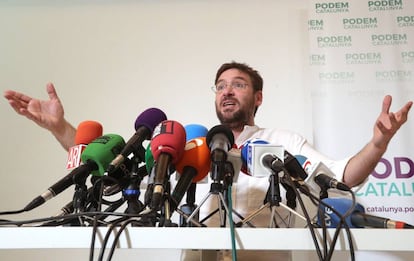Concern about Catalonia
The people who will have to deal with the ongoing secessionist crisis are, unfortunately, politicians with low popularity ratings

The Catalan crisis – which the latest Center for Sociology Research (CIS) survey shows to be, for the first time, Spaniards’ second top concern after unemployment – now more than ever requires well-respected politicians with the ability to strike deals. Yet the same survey shows that citizen confidence in politicians, who are the people in charge of solving the problem, remains at historical lows.
Podemos presumes to be more democratic than other political forces
The solution to the Catalan problem will inevitably require reforming the Spanish Constitution with the aim of altering the Spanish state’s territorial structure. But not, as some want, to make it more centralized. In a short space of time, Spain managed the feat of turning a centralized, dictatorial state into a democratic one with devolved powers to the regions. It is the world’s second-most-decentralized country (after Germany), according to the Regional Authority Index, and its economic and social progress has been spectacular throughout these years.
Democracy and self-government have gone hand in hand. And a majority of Spaniards see it that way. According to the CIS poll, Spain’s public opinion maintains its confidence in the system of autonomous regions, despite being seriously concerned about the separatist challenge. In fact, over the last four years there has been a rise in the percentage of Spaniards who support the current state structure (32.6% in 2012; 39.2% in October 2017) and a fall in those who prefer a strong central government with no regional powers (22.5% in 2012; 17.5% in October 2017).
There is evidence of this consensus in the very limited success that the principle of the right to decide (and its resulting corollary, self-determination) enjoys among the Spanish population. Secessionist propaganda, coupled with the allegedly democratic and conciliatory tone struck by Podemos and its regional partners, have generated the illusion that a majority of citizens defend this right because it is unquestionably democratic. The fact is, when the question is asked directly and without tricks, only 10.2% of respondents say they want a Spanish state that recognizes the possibility that autonomous regions could become an independent state of their own. That is exactly the same percentage as four years ago.
Democracy and self-government have gone hand in hand, and a majority of Spaniards see it that way
These CIS results might provide Podemos with one of the reasons for its own eroding support. Its position with regard to the Catalan crisis, as the numerous university professors who head the party surely know, is unsustainable because it is deceitful and populist. Their arguments sustain ambitions of independence, but it is not the kind of attitude befitting a nationwide party that claims to be contrary to secession. Its failure to take a clear stand has already triggered a serious internal schism. Podemos presumes to be more democratic than other political forces by defending the right to decide of a few over the rest. Its likely debacle at the Catalan elections of December 21 could herald its fall at the national level. If Spaniards consider politicians a top cause for concern, it is because they generate problems instead of trying to solve them. Podemos chief Pablo Iglesias got the worst rating of all national leaders. This CIS survey is talking directly to him.
English version by Susana Urra.
Tu suscripción se está usando en otro dispositivo
¿Quieres añadir otro usuario a tu suscripción?
Si continúas leyendo en este dispositivo, no se podrá leer en el otro.
FlechaTu suscripción se está usando en otro dispositivo y solo puedes acceder a EL PAÍS desde un dispositivo a la vez.
Si quieres compartir tu cuenta, cambia tu suscripción a la modalidad Premium, así podrás añadir otro usuario. Cada uno accederá con su propia cuenta de email, lo que os permitirá personalizar vuestra experiencia en EL PAÍS.
¿Tienes una suscripción de empresa? Accede aquí para contratar más cuentas.
En el caso de no saber quién está usando tu cuenta, te recomendamos cambiar tu contraseña aquí.
Si decides continuar compartiendo tu cuenta, este mensaje se mostrará en tu dispositivo y en el de la otra persona que está usando tu cuenta de forma indefinida, afectando a tu experiencia de lectura. Puedes consultar aquí los términos y condiciones de la suscripción digital.








































